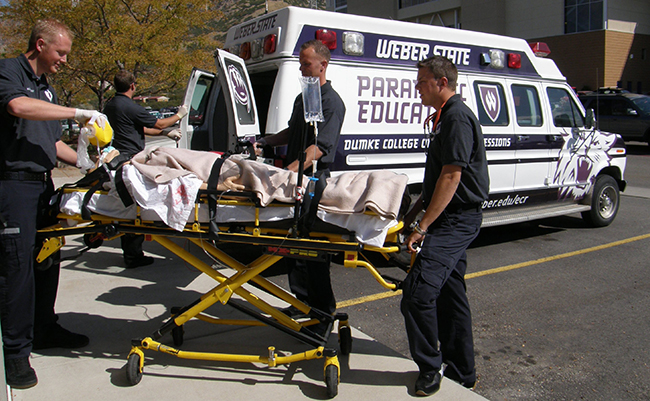Weber State's paramedic program offers interdisciplinary education provided by bachelors, masters, and doctoral educated paramedics, nurses, and physicians. With over 1200 hours of education above and beyond the paramedic prerequisites, the WSU paramedic program is a time-tested formula of lectures, skill labs, clinical, and field internships. The WSU paramedic program has access to millions of dollars in state-of-the-art equipment to include high fidelity mannequins, virtual reality, simulated ambulance and labs, and numerous real and simulated medical devices and equipment. The following represents more of what makes the WSU paramedic program second to none.
Weber State University Paramedic Program
The paramedic program at Weber State University was the first accredited program in the state of Utah and one of the first in the entire nation. Interested candidates for the paramedic program can apply to one of two cohorts (Fall and Spring) that are offered each academic year. Each cohort also has a distance learning option. Prospective paramedic candidates are encouraged to visit our FAQs page prior to contacting our department.
Program Description

More Opportunities
Exceptional Pass Rates
WSU Paramedic graduates have a long standing first attempt pass rate of 98 - 100% on the National Registry exam for any rolling three year period. This is compared to the national average of 76%. As such, graduates rank in the top 5% nationally. While this is an exceptional ranking, the program is always striving to improve. Prior to the state of Utah implementing the National Registry test, in over 30 years, no Weber State student ever failed the Utah Bureau of EMS written exam. The most recent published outcomes for the WSU paramedic program can be found here.
Outstanding Clinical Opportunities
WSU paramedic students participate in up to 240 hours of supervised hospital rotations and 480 hours of field internship on an ambulance. Clinical rotations include many areas not included in other programs, including the operating room, cath lab, obstetrics, pediatrics, and the burn unit. WSU students achieve 400% more supervised endotracheal intubations than the average paramedic student in the nation.
Scholarship opportunities
Thanks to the exceptional support of alumni, faculty, and friends of the department, multiple scholarship opportunities are available for books and tuition.